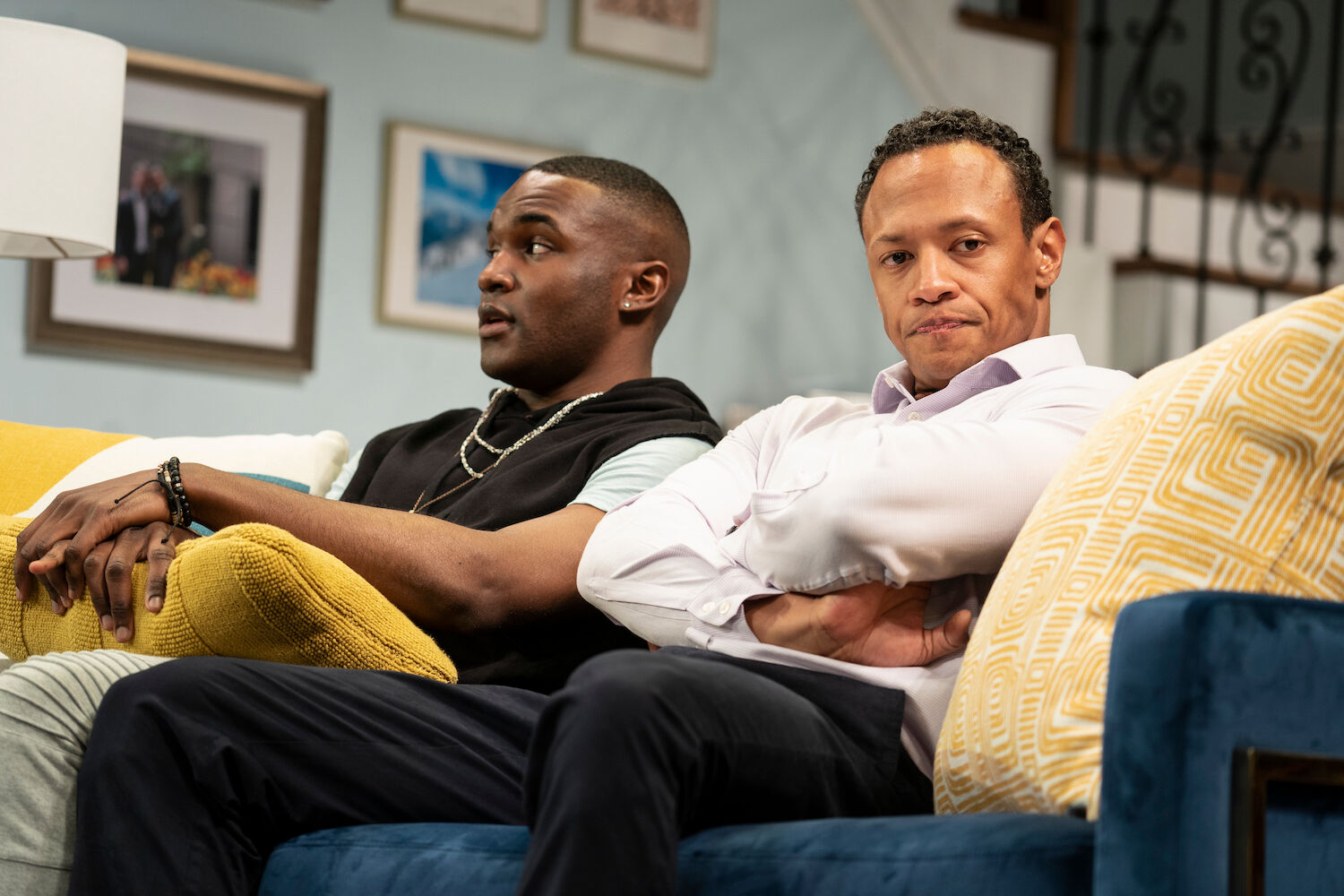In Mansa Ra’s deceptively simple new comedy, …what the end will be, three generations of Black men confront mortality, homophobia, and escaping generational trauma.
As part of his New York Times Critic’s Pick review of the play, Queerty contributor Naveen Kumar wrote, “In …what the end will be, facing death really means reckoning with life — what makes it worth living despite its impermanence — and learning how to seize some measure of joy for yourself. It’s everything that is meant when we say that Black lives matter.”
And how. On first viewing of Reid Thompson’s gorgeous set at the Laura Pels Theatre in New York City, audiences will likely think that they’ve wandered into a situational comedy about three wacky dudes who don’t know how to get along.
Related: How the Pulitzer Prize-Winning “Fat Ham” Flips the Script on “Hamlet”
We’re lulled into thinking so by the familiar scenario: rascally-and-defiant grandpa Bartholomew Kennedy (Keith Randolph Smith) can no longer take care of himself and has moved in with his well-to-do though uptight son Maxwell (Emerson Brooks) and confident but figuring-himself-out grandson Tony (Gerald Caesar). But even before the second scene has ended, it becomes clear that this Roundabout Theatre Company-commissioned piece is far more complex.
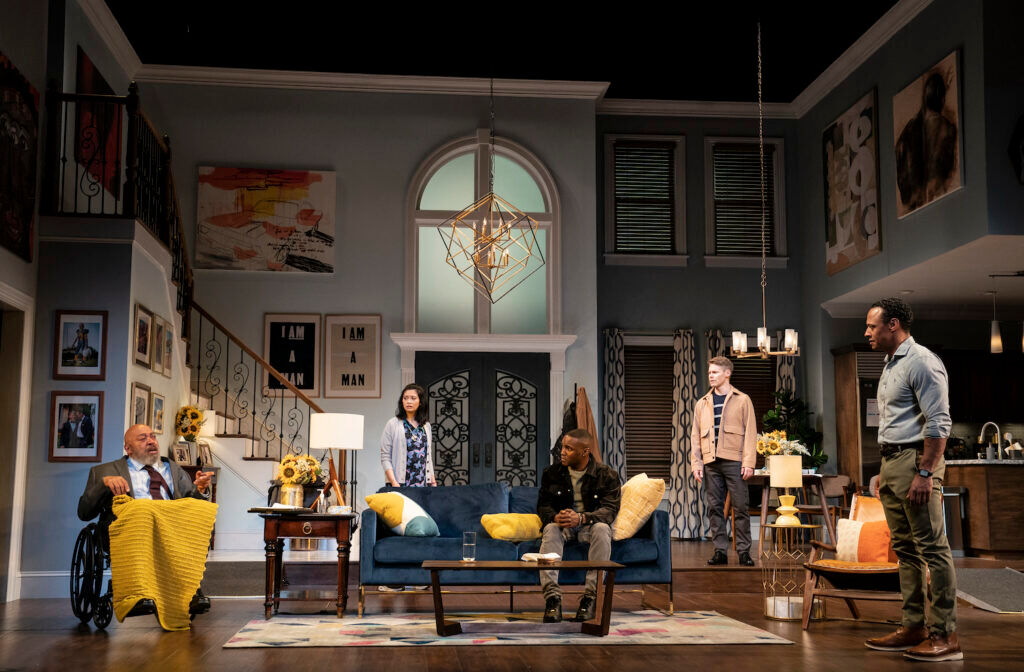
The divergent point is that Bartholomew is sick with cancer. His struggles exasperate the household’s already seething tensions. Maxwell puts on a good show of ignoring how dire things are for his father while trying to force his son to fit into his mold of a successful Black man. Meanwhile, Bartholomew simply wants his pain to end while Tony wishes to be left alone to sort out his so-called teenage love life. What ignites this fraught scenario is that all three are gay, with Maxwell living halfway in the closet and pissed at his father for coming out immediately after his mother’s death, and Tony revealing his truth after rejecting his father’s homophobia.
The show’s three leading actors recently spoke to INTO about the significance of playing these nuanced roles as well as the freedom that comes from rejecting respectability politics.
INTO: It felt easy to paint Maxwell as the show’s “ bad guy” because of his inability to escape toxic masculinity. Can you talk about balancing out the severe sides of his character with his obvious need for affection?
Emerson Brooks: I think the more delicate process in developing Maxwell’s character was making him this whole person and showing that he is carrying a lot of burdens that are all coming to a head at this point in his life. He’s dealing with his son, who’s becoming an adult, operating in the world successfully, and dealing with his father who may not be with us for much longer, and taking on a role that he feels ill-equipped to handle.
Maxwell is caught in the middle of trying to balance those things using the tools that his father gave him. Maybe at times, he doesn’t do it in the best way, even when his intentions are pure, but I hope we take the audience on a journey to see that there’s space for forgiveness.
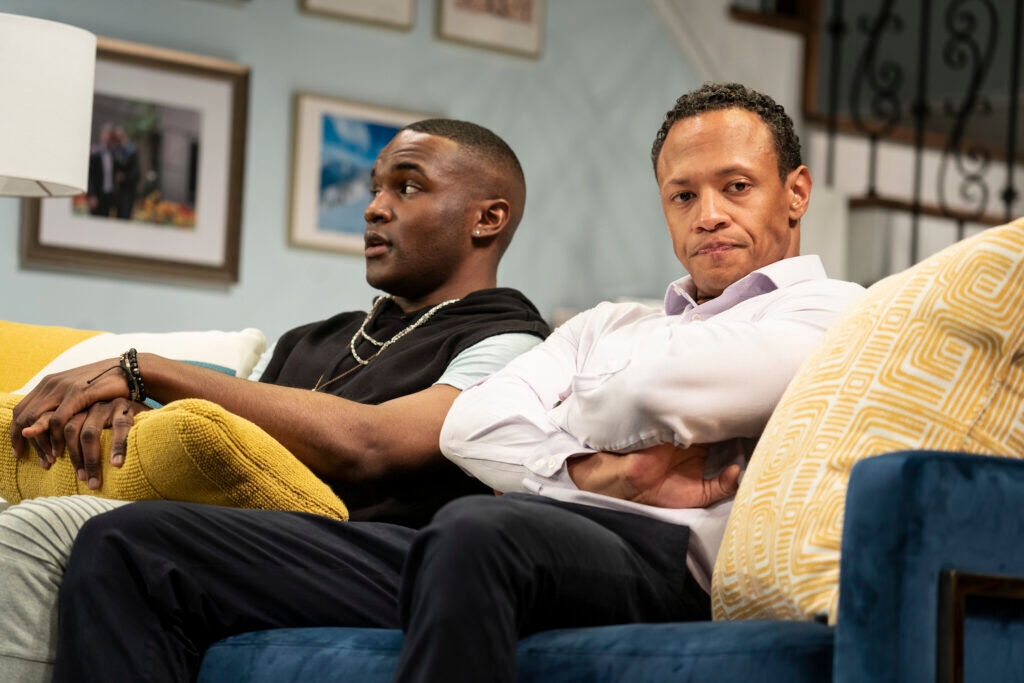
INTO: Gerald, do you see Tony as being able to understand and give his father grace?
Gerald Caesar: I don’t think that teenagers have the wisdom or the perspective to be able to see that a parent or person is struggling. Things feel so personal at that age. I think Tony sees his father as someone who needs assistance and who makes his life more difficult.
“I hope we take the audience on a journey to see that there’s space for forgiveness.”
INTO: Keith, what advice might you have for children on forgiving their fathers for not being who they needed them to be?
Keith Randolph Smith: How do you broach that conversation? The answer is relatively simple: you broach it. You just start talking. It’s not going to be perfect. It’ll be messy because we’re human beings; perfectly imperfect.
Brooks: I’ll tag on to that with something Kendrick Lamar said recently: “Hurt people hurt people.” We can only operate with the tools that we’ve been given, until we gain new tools, forgive, and let go of the idealized version of who we thought people should’ve been.
Looking at Maxwell, this is a human being who experienced things that I’ll never comprehend. And I’m not necessarily forgiving all of his behaviors but I can have a little grace. I think we can have much more effective conversations to talk about the messy things that Keith is talking about by seeing people as people, instead of judging them for where they failed.
INTO: There is so much humor in this piece, which might be why the moments of pathos ring out so clearly. How do you balance your performance between the comedy and the sophisticated dive into Black male relationships?
Caesar: I’m borrowing this from Cynthia Erivo. I take everything one step at a time; not thinking about the destination; not thinking about what I have to do; or what’s going on. But I don’t know if I have to balance it so much because I’m not the one responsible for bringing the laughs.
Brooks: You’re pretty funny in this.
Caesar: I don’t feel funny at all.
INTO: That might be what makes it funny.
Brooks: From an acting perspective, there was no anticipation because we were focused on living truthfully in the characters. The comedy comes from everyone sharing their experiences from their own lives.
Smith: I like that you see the comedy and the pathos, because when you’re inside of a story, you may be aware that you’re working one step at a time, but the audience gets to enjoy the whole meal. We’re just back there chopping up celery, pulling greens, and preparing the table.
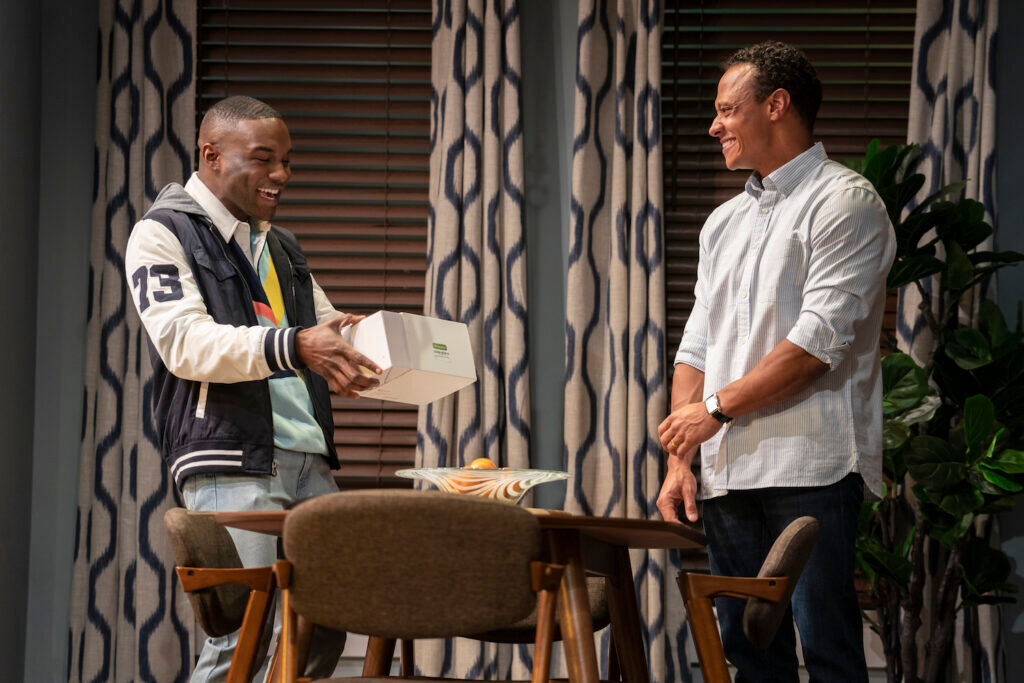
INTO: Is there a specific audience who you want to see this show? For instance, I’d love some of my former students to watch so that they could realize that they are going to be okay.
Caesar: I think the people I want to see the show are never gonna see it. I mean, they probably don’t have access or even know that it exists. I like to think about the Midwest a lot because it’s such a no man’s land in my mind, outside of its national parks and whatnot. It’s not difficult to step back in time when you’re not on the coast or in a major city.
Like, my uncle is super masculine and when I hear stories about when he was growing up, I start to realize how homophobic he was in the 70s or 80s. But when I came home last Christmas, he was singing songs from The Prom. And I was like, “Wow, this is actually affecting you. You actually understand more about what it is to be gay or to be repressed because of this movie musical by Ryan Murphy.”
That show can be really fluffy but it still got across because it was a movie and that has me thinking about the people who will never come to New York City to see this play. But I find that people who need these messages tend to get them last, unfortunately.
Maybe because they’re protecting themselves or being shielded from something. Or maybe their scope is small because of their environment. There are so many reasons, but hopefully, this message gets to those who need it most to save their lives. I’m thinking particularly about people who are younger or who are in the closet at any age or someone who’s not accepted by their family.
Smith: Let everybody come! That’s the beauty of art. It’s subjective, and you get out of it what you get out of it. I played a drag queen years ago on tour [Holiday Heart]. While we were in Seattle, a reverend wrote a letter to the theatre thanking me for the performance because his son was gay. The reverend had never accepted his son’s queerness and he felt so ashamed.
But he ended up liking my character, Holiday, and saw that he was like his son. So he called him after the show. I don’t know how their conversation went but that’s the kind of unexpected effect that a work of art can have on people. It can open doors. So here’s hoping that the people who come end up finding some relevance within their lives. Because it’s either a window or a mirror for life; you can learn something you didn’t know or see and ask yourself questions.
INTO: Now I want to see you in a full beat and drag.
Smith: I was much younger and slimmer back then.
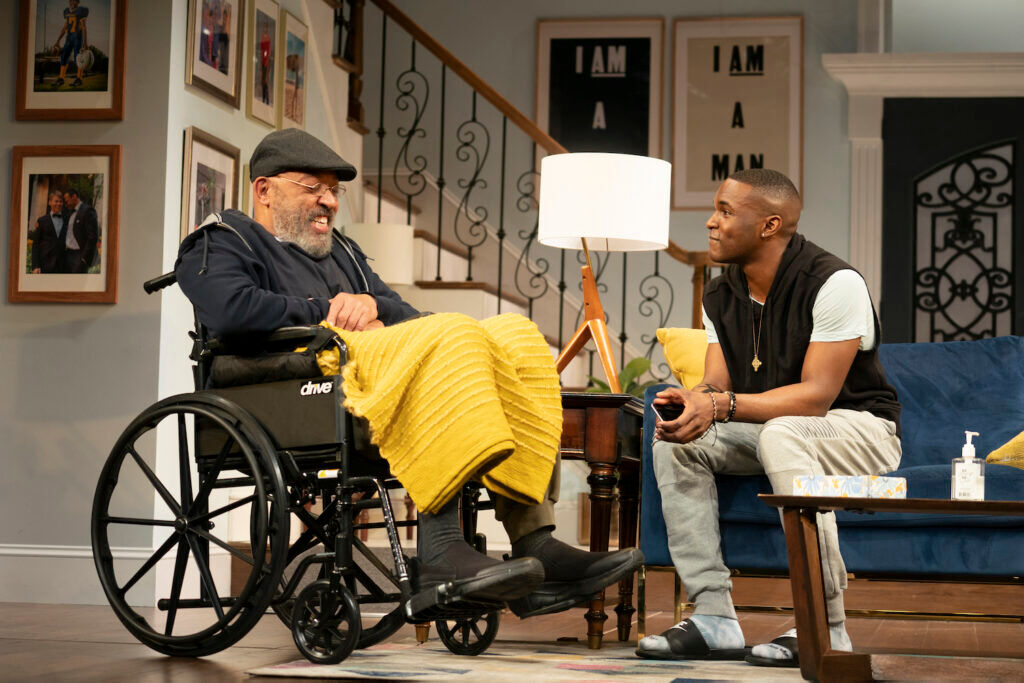
INTO: Thinking about windows and mirrors, I feel like you’re talking about the importance of representation. After I saw you all perform, these two older white people told me that they didn’t realize that Black people had feelings like this. And I’m wondering if you feel a call to be a possible model for what Black can be?
Brooks: I spent most of my life doing that and I woke up not so long ago and said that’s not my responsibility. My responsibility is to exist as a decent human being and I’m not going to go out and prove to the world that I’m acceptable.
I’m glad the people you sat with took that away from it, but I don’t think any of us should take on that burden of correcting someone else’s ignorance. People who want to do that can do that for themselves. I’m not going to put that on me. The world puts enough burden on me. And it makes me a little emotional to think about because as soon as I walk into a room, the expectations are so low that I put it on myself to outperform those expectations as a representation for everyone that looks like me.
But I’m not going to do that anymore. Because I’m not really doing it for me anyway; I’m not doing it for those people who I think I’m doing it for either; I’m doing it for someone else and their ignorance. And that’s not our responsibility. But hopefully, the people who see the show come willingly and accept that this is an opportunity for them to grow.
I think that’s very representative of why Maxwell is the way he is in the show; because he has taken on proving himself to multiple classes and generations of people. And I think that’s just another set of chains that people need to unshackle themselves from.
INTO: The intersectionality in what you just said is taking me out. Thank you. Gerald, I’m curious about your perspective on respectability politics, especially because your character isn’t locked into an idea of how he’s supposed to behave.
Caesar: I think it’s exhausting. I’ve just always grown up in such ultra-white environments and looking at my successes, I’ve had to balance who I am versus who I’ve tried to be while learning that no matter what I do, I’m not going to change anyone’s core beliefs. I don’t matter to them.
I have a friend who I used to call Olivia Pope. She was one of three Black people in my class, had a crazy GPA, and was the first person in our school system to double major in these two specific concentrations. And I remember at her graduation, there was a parent looking at the program who was finding all these excuses for why she was so exceptional. And I was like, this is the most objective way to measure success.
It was just so easy to be like you’re smart or you’re not. You’re talented or you’re not and everything in between. That was one of those formative moments where I was like, “No matter what, you’re always gonna think this. Or if not, you will see me as the magical Negro or the exception.” As a kid, I prided myself on that. Because what else do you know? You’d gain respect if you followed the rules: “I’m good. I’m respectable. I’m acceptable. I can be in these spaces.” But in reality, I was doing so much work consciously and subconsciously, to fit into a box that someone who’s underperforming created.
Now that I’m older, I’m like, “Why did I work so hard?” I resent it a lot. I don’t subscribe to respectability at all. And maybe that’s why I like to stay at home. It’s something that makes me upset and I wish that it wasn’t necessary to live this way. But you do have to play the game or show up in certain ways. It’s a balancing act, but we all have to do it.
INTO: I don’t think everybody has to do it, but I know a lot of us do. It’s interesting because I don’t put my queerness in front of people, but I do put my HIV at the forefront. I’m like, “I want you to know that this is how HIV can look. And I want you to know that this person who has authority is living with HIV.” But I wish that I had the luxury to be as mediocre as anyone who doesn’t have to prove that they have a right to exist.
Brooks: It is exhausting. Because so much of the energy is trying to change people who have no interest in receiving what you’re trying to do or what you’re offering. They’ve got to get there on their own. I’m just gonna go out in the world and take up as much space as I need and if you’re offended by that, f*ck it. If that does something for you, great.
INTO: Keith, you’ve been doing this for longer than all of us. Has it been difficult waiting for the opportunity to see Black men openly loving on each other on stage instead of going at each other with stereotypical violence?
Smith: I just thank God for writers who have the fortitude, wherewithal, and honor to put this representation onstage and in film. Because representation does matter. It’s not as much or as fast as I’d like. And I’m not giving gold stars out for the little incremental change that has happened. Many times, people want gold stars and I’m just like, “There’s still work to do; get your stars later, baby.”♦
…what the end will be plays at Laura Pels Theatre through July 10.
Don't forget to share:
Help make sure LGBTQ+ stories are being told...
We can't rely on mainstream media to tell our stories. That's why we don't lock our articles behind a paywall. Will you support our mission with a contribution today?
Cancel anytime · Proudly LGBTQ+ owned and operated
Read More in Culture
The Latest on INTO
Subscribe to get a twice-weekly dose of queer news, updates, and insights from the INTO team.
in Your Inbox

